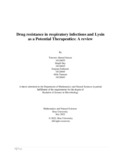Drug resistance in respiratory infections and Lysin as a Potential Therapeutics: A review
Date
2022-07Metadata
Show full item recordAbstract
The emergence and spread of respiratory drug-resistant bacteria that have gained novel resistance
mechanisms, resulting in antimicrobial resistance, continues to pose a danger to our capacity to
treat common respiratory infections. The primary objective of this paper's findings is to address
this major problem. Bacteriophage-encoded lytic enzymes have long been studied as a potential
alternative to antibiotics in the fight against bacterial infections. These enzymes, which function
by degrading peptidoglycan, a crucial part of the bacterial cell wall, have an antibacterial effect.
Multiple studies have previously shown that using different lysins to counteract various pathogenic
bacteria that cause respiratory tract infections has had positive outcomes. High-dose Cpl-1
eliminates Streptococcus pneumoniae faster than vancomycin and stimulates cytokine production.
Lysin 23TH 48 is effective against Streptococcus pneumoniae. LysP108's unique amino acid
sequence and domain structure may be combined with drugs to prevent bacterial antibiotic
resistance. Streptococcus pyogenes cells could be destroyed by PlyC, a unique multimeric enzyme
that is effective against group A streptococci. Art-175 is a thermostable artilysin produced by
mixing lysin KZ144 with sheep myeloid AMP-29 (SMAP-29). Art-175 suppressed persister
development, a post-antibiotic bacterial subpopulation. LysCA and LysG24 may reduce
pulmonary inflammation and LPKP growth. Clinical symptoms and bacterial load in the mouse
lungs favored LysCA. LysAB3, LysAB4, PlyAB1, and LysABP-01 were designed to kill
Acitenobacter baumannii. PlyF307 may kill planktonic and biofilm Acitenobacter baumannii
isolates, including MDR strains. This review study addressed the significant antibiotic resistance
of respiratory pathogens that are no longer effectively treated by antibiotics and demonstrated an
alternative, the use of lysin, based on several successful in vivo and in vitro studies.

